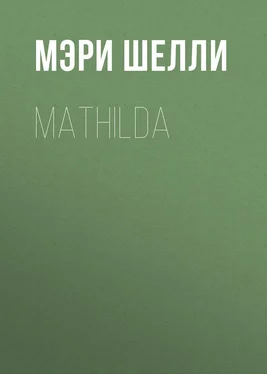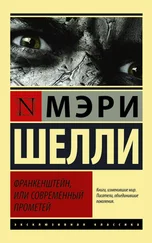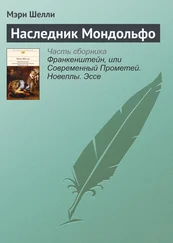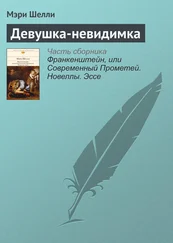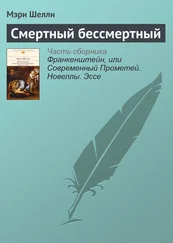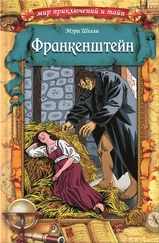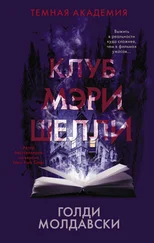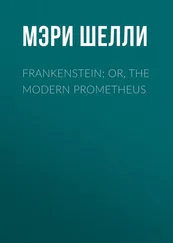Мэри Шелли - Mathilda
Здесь есть возможность читать онлайн «Мэри Шелли - Mathilda» — ознакомительный отрывок электронной книги совершенно бесплатно, а после прочтения отрывка купить полную версию. В некоторых случаях можно слушать аудио, скачать через торрент в формате fb2 и присутствует краткое содержание. Жанр: literature_19, foreign_antique, foreign_prose, на английском языке. Описание произведения, (предисловие) а так же отзывы посетителей доступны на портале библиотеки ЛибКат.
- Название:Mathilda
- Автор:
- Жанр:
- Год:неизвестен
- ISBN:нет данных
- Рейтинг книги:3 / 5. Голосов: 1
-
Избранное:Добавить в избранное
- Отзывы:
-
Ваша оценка:
- 60
- 1
- 2
- 3
- 4
- 5
Mathilda: краткое содержание, описание и аннотация
Предлагаем к чтению аннотацию, описание, краткое содержание или предисловие (зависит от того, что написал сам автор книги «Mathilda»). Если вы не нашли необходимую информацию о книге — напишите в комментариях, мы постараемся отыскать её.
Mathilda — читать онлайн ознакомительный отрывок
Ниже представлен текст книги, разбитый по страницам. Система сохранения места последней прочитанной страницы, позволяет с удобством читать онлайн бесплатно книгу «Mathilda», без необходимости каждый раз заново искать на чём Вы остановились. Поставьте закладку, и сможете в любой момент перейти на страницу, на которой закончили чтение.
Интервал:
Закладка:
Mary Wollstonecraft Shelley
Mathilda
This volume prints for the first time the full text of Mary Shelley's novelette Mathilda together with the opening pages of its rough draft, The Fields of Fancy . They are transcribed from the microfilm of the notebooks belonging to Lord Abinger which is in the library of Duke University.
The text follows Mary Shelley's manuscript exactly except for the omission of mere corrections by the author, most of which are negligible; those that are significant are included and explained in the notes. Footnotes indicated by an asterisk are Mrs. Shelley's own notes. She was in general a fairly good speller, but certain words, especially those in which there was a question of doubling or not doubling a letter, gave her trouble: untill (though occasionally she deleted the final l or wrote the word correctly), agreable, occured, confering, buble, meaness, receeded, as well as hopless, lonly, seperate, extactic, sacrifise, desart, and words ending in – ance or – ence. These and other mispellings (even those of proper names) are reproduced without change or comment. The use of sic and of square brackets is reserved to indicate evident slips of the pen, obviously incorrect, unclear, or incomplete phrasing and punctuation, and my conjectures in emending them.
I am very grateful to the library of Duke University and to its librarian, Dr. Benjamin E. Powell, not only for permission to transcribe and publish this work by Mary Shelley but also for the many courtesies shown to me when they welcomed me as a visiting scholar in 1956. To Lord Abinger also my thanks are due for adding his approval of my undertaking, and to the Curators of the Bodleian Library for permiting me to use and to quote from the papers in the reserved Shelley Collection. Other libraries and individuals helped me while I was editing Mathilda : the Enoch Pratt Free Library of Baltimore, whose Literature and Reference Departments went to endless trouble for me; the Julia Rogers Library of Goucher College and its staff; the library of the University of Pennsylvania; Miss R. Glynn Grylls (Lady Mander); Professor Lewis Patton of Duke University; Professor Frederick L. Jones of the University of Pennsylvania; and many other persons who did me favors that seemed to them small but that to me were very great.
I owe much also to previous books by and about the Shelleys. Those to which I have referred more than once in the introduction and notes are here given with the abbreviated form which I have used:
Frederick L. Jones, ed. The Letters of Mary W. Shelley , 2 vols. Norman: University of Oklahoma Press, 1944 ( Letters )
– Mary Shelley's Journal . Norman: University of Oklahoma Press, 1947 ( Journal )
Roger Ingpen and W.E. Peck, eds. The Complete Works of Percy Bysshe Shelley , Julian Edition, 10 vols. London, 1926-1930 (Julian Works )
Newman Ivey White. Shelley , 2 vols. New York: Knopf, 1940 (White, Shelley )
Elizabeth Nitchie. Mary Shelley, Author of "Frankenstein." New Brunswick: Rutgers University Press, 1953 (Nitchie, Mary Shelley )
May, 1959
Of all the novels and stories which Mary Wollstonecraft Shelley left in manuscript, 1 1 They are listed in Nitchie, Mary Shelley, Appendix II, pp. 205-208. To them should be added an unfinished and unpublished novel, Cecil, in Lord Abinger's collection.
only one novelette, Mathilda , is complete. It exists in both rough draft and final copy. In this story, as in all Mary Shelley's writing, there is much that is autobiographical: it would be hard to find a more self-revealing work. For an understanding of Mary's character, especially as she saw herself, and of her attitude toward Shelley and toward Godwin in 1819, this tale is an important document. Although the main narrative, that of the father's incestuous love for his daughter, his suicide, and Mathilda's consequent withdrawal from society to a lonely heath, is not in any real sense autobiographical, many elements in it are drawn from reality. The three main characters are clearly Mary herself, Godwin, and Shelley, and their relations can easily be reassorted to correspond with actuality.
Highly personal as the story was, Mary Shelley hoped that it would be published, evidently believing that the characters and the situations were sufficiently disguised. In May of 1820 she sent it to England by her friends, the Gisbornes, with a request that her father would arrange for its publication. But Mathilda , together with its rough draft entitled The Fields of Fancy , remained unpublished among the Shelley papers. Although Mary's references to it in her letters and journal aroused some curiosity among scholars, it also remained unexamined until comparatively recently.
This seeming neglect was due partly to the circumstances attending the distribution of the family papers after the deaths of Sir Percy and Lady Shelley. One part of them went to the Bodleian Library to become a reserved collection which, by the terms of Lady Shelley's will, was opened to scholars only under definite restrictions. Another part went to Lady Shelley's niece and, in turn, to her heirs, who for a time did not make the manuscripts available for study. A third part went to Sir John Shelley-Rolls, the poet's grand-nephew, who released much important Shelley material, but not all the scattered manuscripts. In this division, the two notebooks containing the finished draft of Mathilda and a portion of The Fields of Fancy went to Lord Abinger, the notebook containing the remainder of the rough draft to the Bodleian Library, and some loose sheets containing additions and revisions to Sir John Shelley-Rolls. Happily all the manuscripts are now accessible to scholars, and it is possible to publish the full text of Mathilda with such additions from The Fields of Fancy as are significant. 2 2 On the basis of the Bodleian notebook and some information about the complete story kindly furnished me by Miss R. Glynn Grylls, I wrote an article, "Mary Shelley's Mathilda, an Unpublished Story and Its Biographical Significance," which appeared in Studies in Philology, XL (1943), 447-462. When the other manuscripts became available, I was able to use them for my book, Mary Shelley, and to draw conclusions more certain and well-founded than the conjectures I had made ten years earlier.
The three notebooks are alike in format. 3 3 A note, probably in Richard Garnett's hand, enclosed in a MS box with the two notebooks in Lord Abinger's collection describes them as of Italian make with "slanting head bands, inserted through the covers." Professor Lewis Patton's list of the contents of the microfilms in the Duke University Library (Library Notes, No. 27, April, 1953) describes them as vellum bound, the back cover of the Mathilda notebook being missing. Lord Abinger's notebooks are on Reel 11. The Bodleian notebook is catalogued as MSS. Shelley d. 1, the Shelley-Rolls fragments as MSS. Shelley adds c. 5.
One of Lord Abinger's notebooks contains the first part of The Fields of Fancy , Chapter 1 through the beginning of Chapter 10, 116 pages. The concluding portion occupies the first fifty-four pages of the Bodleian notebook. There is then a blank page, followed by three and a half pages, scored out, of what seems to be a variant of the end of Chapter 1 and the beginning of Chapter 2. A revised and expanded version of the first part of Mathilda's narrative follows (Chapter 2 and the beginning of Chapter 3), with a break between the account of her girlhood in Scotland and the brief description of her father after his return. Finally there are four pages of a new opening, which was used in Mathilda . This is an extremely rough draft: punctuation is largely confined to the dash, and there are many corrections and alterations. The Shelley-Rolls fragments, twenty-five sheets or slips of paper, usually represent additions to or revisions of The Fields of Fancy : many of them are numbered, and some are keyed into the manuscript in Lord Abinger's notebook. Most of the changes were incorporated in Mathilda .
Интервал:
Закладка:
Похожие книги на «Mathilda»
Представляем Вашему вниманию похожие книги на «Mathilda» списком для выбора. Мы отобрали схожую по названию и смыслу литературу в надежде предоставить читателям больше вариантов отыскать новые, интересные, ещё непрочитанные произведения.
Обсуждение, отзывы о книге «Mathilda» и просто собственные мнения читателей. Оставьте ваши комментарии, напишите, что Вы думаете о произведении, его смысле или главных героях. Укажите что конкретно понравилось, а что нет, и почему Вы так считаете.
